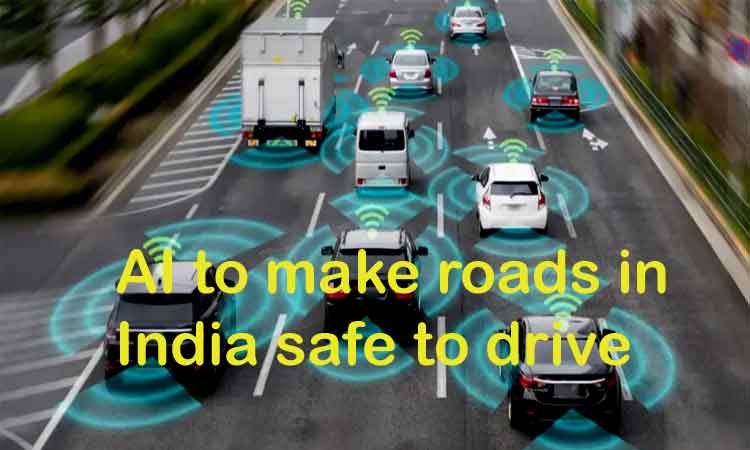
365telugu.com online news, Delhi,May 24th,2022:Artificial Intelligence (AI) powered solutions may soon make roads in India a safer place to drive. A unique AI approach that uses the predictive power of AI to identify risks on the road, and a collision alert system to communicate timely alerts to drivers, to make several improvements related to road safety, is being implemented in Nagpur City with an objective of resulting in a significant reduction of accidents.
The project ‘Intelligent Solutions for Road Safety through Technology and Engineering’ (iRASTE) at Nagpur will identify potential accident-causing scenarios while driving a vehicle and alert drivers about the same with the help of the Advance Driver Assistance System (ADAS). The project will also identify ‘greyspots’, i.e., by data analysis and mobility analysis by continuously monitoring dynamic risks on the entire road network. Greyspots are locations on roads, which left unaddressed could become blackspots (locations with fatal accidents). The system also conducts continuous monitoring of roads and designs engineering fixes to correct existing road blackspots for preventive maintenance and improved road infrastructure.

The iRASTE project is under by the I-Hub Foundation, IIIT Hyderabad, a Technology Innovation Hub (TIH) set up in the technology vertical- Data Banks & Data Services supported by the Department of Science and Technology (DST) under its National Mission on Interdisciplinary Cyber Physical Systems (NM-ICPS) along with INAI (Applied AI Research Institute). The project consortium includes CSIR-CRRI, and Nagpur Municipal Corporation, with Mahindra and Intel as the industry partners.

The Hub is working to coordinate, integrate, and amplify basic and applied research in broad data-driven technologies as well as its dissemination and translation across the country. One of the primary aims is to prepare a critical resource for the future use by researchers, startups, and industry, mainly in the areas of smart mobility, healthcare along with smart buildings.
What makes the iRASTE project even more unique is that AI and technology is being applied to create practical solutions, as a blueprint, for Indian conditions. While the initial rollout of iRASTE is in Nagpur, the eventual goal is to replicate the solution in other cities too. Currently, talks are on with the Telangana government to adopt the technology in a fleet of buses that ply on highways. There are further plans to extend the scope of iRASTE to Goa and Gujarat also.

I-Hub Foundation has also used techniques ranging from machine learning, computer vision and computational sensing for several other data-driven technological solutions in the mobility sector. One such solution is the India Driving Dataset (IDD), a dataset for road scene understanding in unstructured environments captured from Indian roads, which stands out by deviating from the worldwide assumptions of well-delineated infrastructure such as lanes, limited traffic participants, low variation in object or background appearance and strong adherence to traffic rules.
The dataset, a first of its kind, consists of 10,000 images, finely annotated with 34 classes collected from 182 drive sequences on Indian roads obtained from a front-facing camera attached to a car driven around Hyderabad, Bangalore, and their outskirts. The dataset is released in the public domain for unrestricted use under public license and is becoming a defacto dataset for all analysis on Indian road scenes. Currently, there are over 5000 registered users for this dataset across the world.

Another dataset called Open World Object Detection on Road Scenes (ORDER) has also been developed using the India Driving Dataset that could be used by autonomous navigation systems in Indian driving conditions for localization and classification of the objects in a road scene. Besides this, a Mobility Car Data Platform (MCDP) has been designed with several sensors – cameras, LIDARs, with necessary compute for anyone to capture or process data on the car that can help researchers and start-ups in India test their automotive algorithms and approaches in navigation and research on Indian roads.
LaneRoadNet (LRNet), a new framework with an integrated mechanism considering lane and road parameters using deep learning, has been designed to address problems of Indian roads, which have several obstacles, occluded lane markings, broken dividers, cracks, potholes, etc. that put the drivers at significant risk while driving. In this framework, a road quality score is calculated with the help of a modular scoring function. The final score helps the authorities to assess road quality and prioritize maintenance schedules of the road so as to improve the drivability.

In order to help local self-government institutions employ suitable rejuvenation methods in tree starved streets, I-Hub Foundation designed a framework for street tree detection, counting and visualization that uses object detectors and a matching counting algorithm. The work has paved way for a quick, accurate, and inexpensive way to recognize tree-starved streets.

